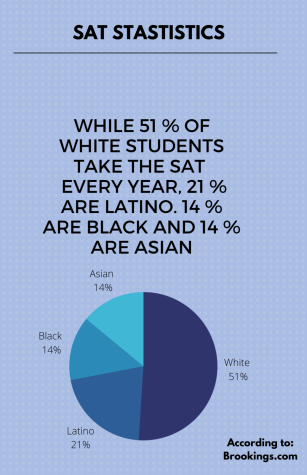SAT unfairness
Standardized testing questions should not be based on students’ race
The SAT was created by a eugenicist named Carl Bringham. He wanted to prove that Jewish people, people of color and Mediterranean students were less intelligent than white people. And in my opinion, a test that was made to show someone’s belief that white students were smarter is a test that is immediately invalid.
When I took the SAT this year, I questioned why it was relevant as the test results show nothing about what kind of student I am. To me, the SAT is another way to make students stress about something that really doesn’t matter in the future. Also, there are legitimate reasons why the SAT shouldn’t be a huge factor for college admissions.
The SAT does not show a student’s potential to succeed in the classroom. It only shows how household income, race and level of parental education are disadvantages when it comes to taking the test.
Statistics reported by Brookings, an American research group, show that the average scores on the math section for Black students are 428 and 457 for Latino students, which are below those of white students with an average of 534, and 598 for Asian students.
Jay Rosner, a national admissions expert, explained in “How the SAT Creates Built-in-Headwinds” that a way test designers decided on which questions would appear on the official test was by looking at the race of students that answered correctly. Questions answered correctly by more Black students were removed by the Educational Testing Service, and those answered correctly by more white students were kept.
While people can argue that this isn’t racism, the test is inherently racist because the questions tend to reflect what white students know. This is unfair because it decreases Black or other minority students’ chances of getting higher scores. The test designers should be looking at all of the data equally.
The test also shows favoritism to wealthier students who have more resources than poor students. Although students who meet a certain criteria get a fee waiver for the first test, in a 2013 paper titled, “Race, Poverty and SAT Scores,” researchers Ezekiel J. Dixon-Roman from the University of Pennsylvania and John J. Mcardle from the University of Southern California, found that wealthier students are more likely to earn higher SAT scores. 
In 2014, the Washington Post revealed that “students from families earning more than $200,000 a year” averaged a combined score over 1,700, while students from families earning under $20,000 a year averaged a combined score slightly over 1,300. Wealthy students also have the advantage of taking the test multiple times, which has been proven to raise student scores, according to the College Board.
Whether or not a student is rich or poor shouldn’t be in the way of getting the best SAT score possible. Wealthy students have access to private tutors and more practice books, which are things low-income students can’t have access to because of the cost. The SAT exam should not be a prominent factor in admitting students into colleges because it doesn’t tell the admission officers anything they need to know about a student’s potential.
In my experience, I was able to score high on the reading and writing sections but not on the math section. What this says about me is that I am better at those two subjects than math. Using one test score to decide whether a student can excel in college is a superficial thing to do, and colleges should stop making it a mandatory requirement.

Hi! My name is Thian Awi, and I am a senior this year. This is my second year of being on The Journal, and I am the Foreign Language Editor. I am originally...







